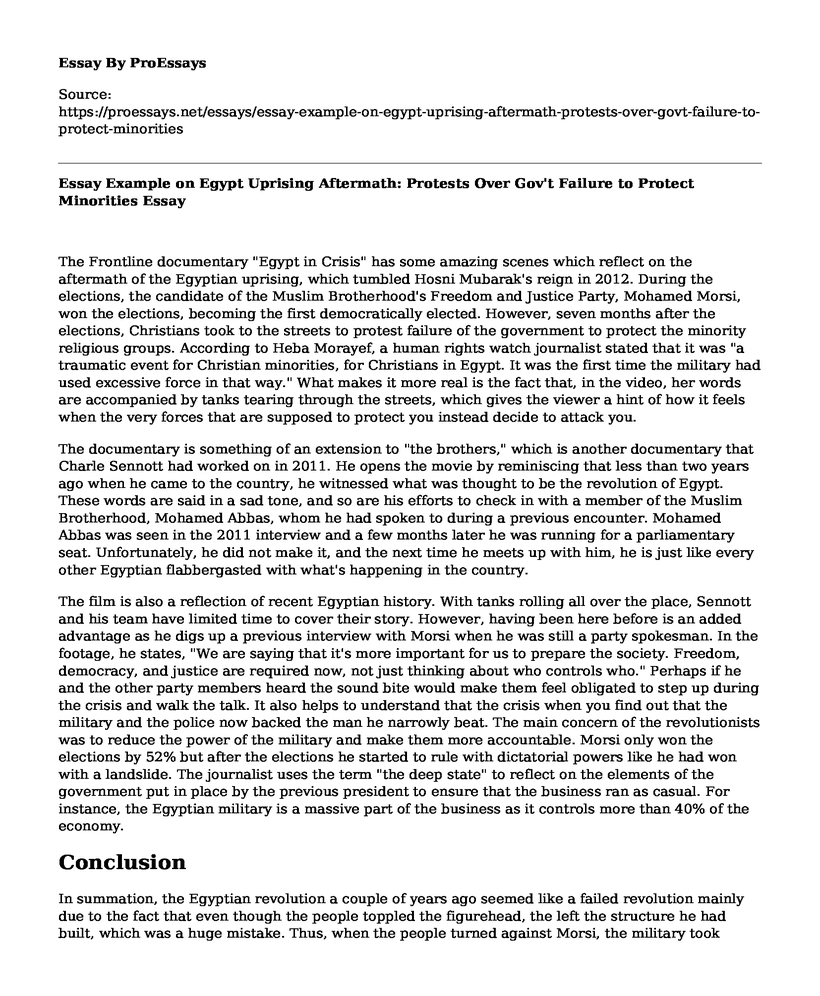The Frontline documentary "Egypt in Crisis" has some amazing scenes which reflect on the aftermath of the Egyptian uprising, which tumbled Hosni Mubarak's reign in 2012. During the elections, the candidate of the Muslim Brotherhood's Freedom and Justice Party, Mohamed Morsi, won the elections, becoming the first democratically elected. However, seven months after the elections, Christians took to the streets to protest failure of the government to protect the minority religious groups. According to Heba Morayef, a human rights watch journalist stated that it was "a traumatic event for Christian minorities, for Christians in Egypt. It was the first time the military had used excessive force in that way." What makes it more real is the fact that, in the video, her words are accompanied by tanks tearing through the streets, which gives the viewer a hint of how it feels when the very forces that are supposed to protect you instead decide to attack you.
The documentary is something of an extension to "the brothers," which is another documentary that Charle Sennott had worked on in 2011. He opens the movie by reminiscing that less than two years ago when he came to the country, he witnessed what was thought to be the revolution of Egypt. These words are said in a sad tone, and so are his efforts to check in with a member of the Muslim Brotherhood, Mohamed Abbas, whom he had spoken to during a previous encounter. Mohamed Abbas was seen in the 2011 interview and a few months later he was running for a parliamentary seat. Unfortunately, he did not make it, and the next time he meets up with him, he is just like every other Egyptian flabbergasted with what's happening in the country.
The film is also a reflection of recent Egyptian history. With tanks rolling all over the place, Sennott and his team have limited time to cover their story. However, having been here before is an added advantage as he digs up a previous interview with Morsi when he was still a party spokesman. In the footage, he states, "We are saying that it's more important for us to prepare the society. Freedom, democracy, and justice are required now, not just thinking about who controls who." Perhaps if he and the other party members heard the sound bite would make them feel obligated to step up during the crisis and walk the talk. It also helps to understand that the crisis when you find out that the military and the police now backed the man he narrowly beat. The main concern of the revolutionists was to reduce the power of the military and make them more accountable. Morsi only won the elections by 52% but after the elections he started to rule with dictatorial powers like he had won with a landslide. The journalist uses the term "the deep state" to reflect on the elements of the government put in place by the previous president to ensure that the business ran as casual. For instance, the Egyptian military is a massive part of the business as it controls more than 40% of the economy.
Conclusion
In summation, the Egyptian revolution a couple of years ago seemed like a failed revolution mainly due to the fact that even though the people toppled the figurehead, the left the structure he had built, which was a huge mistake. Thus, when the people turned against Morsi, the military took advantage of his unpopularity to run the show and smear him as the puppet. The documentary is a sketch of a huge story yet to be told and the next filmmakers should be prepared for how depressing it would be.
Cite this page
Essay Example on Egypt Uprising Aftermath: Protests Over Gov't Failure to Protect Minorities. (2023, Mar 26). Retrieved from https://proessays.net/essays/essay-example-on-egypt-uprising-aftermath-protests-over-govt-failure-to-protect-minorities
If you are the original author of this essay and no longer wish to have it published on the ProEssays website, please click below to request its removal:
- Amadeus Film Essay Example
- Essay Sample on Humanities
- 1960s-70s New Left: Activists Fighting for Social Change - Essay Sample
- Essay Sample on Pre-Marital Sex: An Ethical Dilemma in Contemporary Society
- Essay Example on Medicine Wheel: Symbol of Indigenous Identity & Dignity
- Essay on Harlem Renaissance: Social, Artistic & Intellectual Explosion of African American Culture
- Essay Sample on Social Media: Connecting Digital Worlds and Cheating Lives







